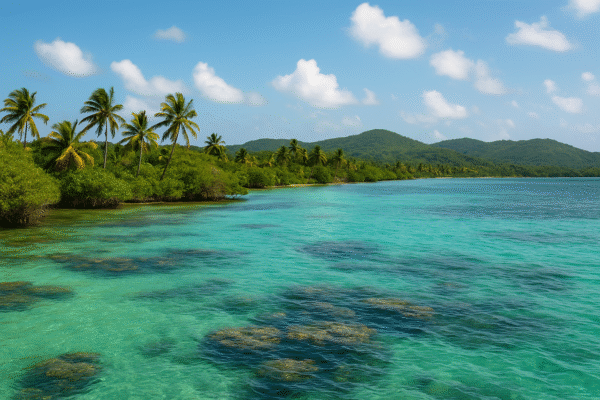A new era is unfolding across the Caribbean, where sun-kissed beaches and vibrant cultures now coexist with forward-looking environmental goals. In a groundbreaking initiative, the Caribbean Tourism Organization (CTO) has signed a Memorandum of Understanding (MOU) with global NGO Conservation International to spearhead regenerative tourism strategies across island nations including the Dominican Republic, Jamaica, Barbados, and the Bahamas.
This two-year collaboration aims to shift tourism from a consumer-based model to one that actively restores ecosystems, supports climate resilience, and uplifts local communities.
A Milestone for Sustainable Island Development
Signed on July 22, the MOU outlines joint commitments in capacity-building, conservation-linked investment, and community-centered development. CTO Secretary-General Dona Regis-Prosper hailed the agreement as a “meaningful step forward” toward a climate-smart, inclusive industry. Conservation International’s Kelvin Alie emphasized how nature-positive tourism can anchor blue economies and protect fragile coastal environments.
The initiative supports island governments like those of Jamaica and the Dominican Republic, which have already embraced climate-resilient tourism in national development plans.
From Coral Reefs to Community Farms: Tourism That Heals
Rather than exploiting natural beauty, the new programs use tourism revenue to restore coral reefs, regenerate forests, and improve local infrastructure. Pilot projects are being rolled out in hotspots like Barbados, Belize, and Saint Lucia, where tour operators are being trained in coral gardening, sustainable agriculture, and reef-safe practices.
Marine guides in the Bahamas, Turks and Caicos, and Puerto Rico are receiving certification in eco-friendly dive and snorkel operations. These efforts help preserve billion-dollar marine tourism industries threatened by climate change and ocean pollution.
Supporting Locals Through Jobs and Culture
Regenerative tourism goes beyond ecology—it uplifts local people and cultures. From craftmakers in Barbados to organic farmers in Saint Vincent, communities are receiving training in sustainable enterprise and market access. Women-led cooperatives in Antigua and the Dominican Republic are being supported to expand supply chains for locally sourced food, herbal wellness products, and handmade souvenirs.
Agro-tourism in Belize’s forest buffer zones is also on the rise, with ecolodges learning regenerative land management practices to reduce deforestation and soil degradation.
Building Climate Resilience Through Nature-Based Projects
Caribbean countries are among the world’s most climate-vulnerable, facing rising sea levels and intensified storms. The MOU enables nature-based solutions such as mangrove restoration in Trinidad and Tobago, and artificial reef construction in Bermuda—critical for shoreline protection and biodiversity.
Governments in Haiti, Jamaica, and Saint Kitts and Nevis are integrating these projects into broader disaster risk management plans aligned with the Caribbean Disaster Emergency Management Agency (CDEMA) frameworks.
Upskilling the Future of Caribbean Tourism
One core aspect of the agreement is education and skill development. Training programs in Curaçao, Aruba, and Saint Lucia will offer workshops in beach conservation, eco-guiding, sustainable hospitality, and ESG business practices.
This builds on the CTO’s INSPIRE program, designed to empower youth and women with the skills to lead the next wave of green tourism entrepreneurship. Countries like Barbados and Jamaica have already pledged to embed these training modules into their national tourism certification systems.
Financing Regenerative Tourism: From Solar Panels to Carbon Credits
The partnership also unlocks access to blue economy grants and public–private funding mechanisms. For example, hotel groups in Trinidad and the Dominican Republic are exploring models where tourist revenue supports solar energy, reef restoration, or carbon-neutral operations.
Green tourism bonds and community tourism microloans are being developed in Bahamas and Saint Lucia to fund lodge renovations, local tourism cooperatives, and reforestation projects.
Marketing a New Caribbean: Regeneration as Experience
CTO is also taking this transformation to the global stage. National tourism boards in Puerto Rico, Jamaica, and the Dominican Republic are crafting “Regenerative Getaway” packages that allow travelers to contribute directly to local conservation—whether through volunteer coral planting or heritage farming visits.
These experiences are aligned with UN Sustainable Development Goals, offering a compelling story to eco-conscious travelers seeking authentic, responsible vacations.
Island Voices: Stories of Transformation
From a fishing village in Jamaica, local captain Marlene now leads reef-planting trips that blend education with conservation. In Barbados, herbalist Simone offers visitors resort-based workshops using oils derived from sustainably grown native plants. And in Antigua, young Kalinago guides lead immersive forest walks rooted in indigenous knowledge and storytelling.
These personal narratives bring to life the heart of the Caribbean’s regenerative tourism movement—community-led, culturally embedded, and environmentally respectful.
Tracking Progress: Transparency and Accountability
To ensure measurable results, CTO and Conservation International will co-develop a regional dashboard monitoring indicators like reef health, youth engagement, and agro-tourism participation. Annual summits and data reporting cycles will support adaptive planning across island governments.
This aligns with national targets for SDG 8 (Decent Work) and SDG 14 (Life Below Water), and bolsters ongoing national tourism strategies.
Looking Ahead: A Regenerative Future for Caribbean Tourism
This bold pivot isn’t just about resilience—it’s about rewriting the story of Caribbean tourism. By choosing regeneration over exploitation, the region is lighting a path toward sustainable prosperity—one where every mangrove planted, reef restored, or community empowered strengthens the legacy of island stewardship.
As the sun sets over a newly rewilded shoreline, a new tourism model rises—inclusive, restorative, and distinctly Caribbean.
For more travel news like this, keep reading Global Travel Wire



















